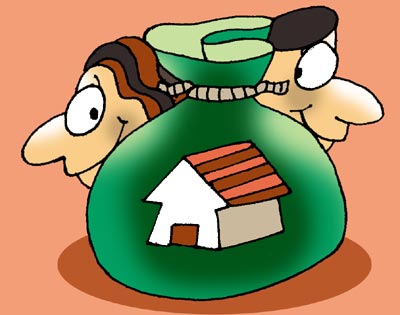 | « Back to article | Print this article |
16 simple steps to buying a home
Buying a house is a dream for many of us. We all want everything to be perfect. The intimidating process of buying a house can be simplified if you follow these basic steps. Keep in mind that every step you take brings you closer to your dream.
Before beginning and taking the first step, you must know if you are ready to be the owner of the house. How ready you are depends on your financial status and how you look forward to take extra responsibilities that come to you with the status of owning a house.
So, now when you know you are ready, here are 16 simple steps that will ease the process of buying a home and keep you aware about every crucial thing you must take care of while going forward.
1. Educate yourself with some of the basic terms of real estate
Before you begin your search, it is necessary that you know about some of the basic terms of real estate. Some of the basic terms include words like real estate broker, common area maintenance, usable square footage, escalation clause, gross lease, deed, letter of intent etc.
2. Make a list of things that you definitely need in a home
Buying a house is a lengthy process which requires a lot of thinking as well before actually looking out. List down your needs and wants and accordingly begin your search.
You may need a home with two bed rooms but you may want a study with it. Decide where you can settle and what the necessities without which you will not settle are.
3. Know your credit score
Most of the buyers opt for home loan when buying a house depending either on the need of finances or in order to save taxes. In most of the countries, credit score is calculated on the basis of your credit card usage, maintenance of bank accounts, bounced checques, existing loans and loan repayments.
Every country has different criteria to decide your loan eligibility.
4. Decide the loan amount before you decide on the house
It may not sound interesting but it is the best to decide the amount and then find a home you want to buy, instead of falling for a house that is totally out of your budget.
It is not very uncommon to see people fall for a beautiful house and struggle to find finances for the same. You may be the happiest person to buy that house at the moment but with passing time the monthly installment of the loan can harm this happiness.
The author writes for 99acres.com
Please click NEXT to continue reading
5. Shortlist two or more locations according to your needs
The location of your house plays a crucial role in the decision making process. So it is important to -- before shortlisting the houses -- shortlist some of the locations that suits your needs.
You will be happy to find a house that does not make you stay on road for a very long time or can be the other way round where you want to live away from the hustle bustle of the city. Take your time and choose accordingly.
6. Check the listings
You should do your homework and check the listings of houses in a particular location and make a list of the ones that meet your needs. This saves you time as well as give you a brief idea about what is there that you are going to look at and the estimated values.
Your smartphones can help you act smart as technology makes it possible to browse through different listings with a simple mobile app.
7. Get a realtor
A good real estate agent will represent you in the entire process of buying a house. From searching to negotiating, s/he shall be a part of everything.
Hence, it is important to find someone that takes care of your interest and is able to connect the buyer and the seller well.
Just remember, your realtor should know every detail about the house you are looking for and about every penny you are willing to spend. Try and look out for someone who knows you at a personal level so s/he will have no professional benefit in helping you out.
8. Look, compare and look again
This is what I needed! Don’t get taken away by the first home you look at.
It may be nice but not even looking at other houses is like ignoring your chances of finding something better. It is a decision for a lifetime and once made cannot be reversed.
In order to be sure look at every option that you can, compare the prices and then go ahead making the decision.
Please click NEXT to continue reading
9. Evaluate the neighbourhood
As important it is to evaluate the house you are going to live in, it is equally important to evaluate the neighbourhood. See how well the blocks, gardens and roads are maintained, how much is the parking space, how social are people (if it matters to you).
10. Analyse the seller’s situation for your benefit
Why is it important? You are going to make an investment that can cost you a lifetime and saving any penny out of this is a bonus to you.
Analysing the seller’s situation at times can help you make an offer that can save you some money. Analyse things like, is the seller in urgent need of selling the house, or is in urgent need of money, since how long has he been looking out to sell the home.
11. Lay down your demands clearly
It is important that the seller knows exactly what you are expecting out of the house. Lay down certain conditions, fixtures or repairs that the house needs.
Make sure you are not paying for any repairs. Also try and get stuff from the seller that you want in your house. You may not be successful and may have to pay for the additions in the house, but it is worth a try for the lifetime deal you are making.
12. Become a smart bidder
You will have to work on your negotiation skills and become a smart bidder. You may think that your real estate agent will do this for you but your negotiating will put more emphasis on the seller.
The realtor will help you by giving you a comparative analysis of similar houses in the vicinity so that you can make your offer smartly.
Please click NEXT to continue reading
13. Calculate your added expenses
You thought just buying the house will be the cost you will need to bear. Here is the reality check that you need to do.
There are going to be added costs to your housing expenses. Take care of the house taxes that you will have to pay annually for the house you are buying.
It is always better to estimate an approximate value before making the deal so that you know if you are ready to bear that cost or not. Other expenses include costs like insurance, bills and the monthly installments that you will have to pay against the loan taken (if any).
14. Get the house inspected
There are various inspections about the house that you should make before finalising the deal. Your realtor can help you with getting the required inspections done.
These inspections help you to be clearer about your choice or even at times let you renegotiate the offer. Make sure you get the house inspected before closing the escrow.
15. Plan well to avoid last minute hassles
For as big a deal as to buy a home, you should at every step avoid the last minute hassles.
Check the progress of every step daily especially that involve finances and loans.
Make the offer with a date that has at least a time gap of three to four days from the date your loan gets approved so that even if the bank or financial institution takes time, you can stick to your commitment.
16. Coordinate the paperwork and close the deal
Phew! Finally when you have made your mind to buy the house, involve yourself completely in the paperwork and close the deal.
Hire a lawyer if you are not sure about the legal formalities that need to be done in the process. Get the house transferred in your name, make the down payment and get ready to shift.
At closing, you will have to sign the paperwork that includes the transfer papers and loan approval papers. Once the checque is received by the seller you are ready to shift in the home you bought.
Follow these steps for a smooth purchase and avoid any hassles at all. ommon to see people fall for a beautiful house and struggle to find finances for the same. You may be the happiest person to buy that house at the moment but with passing time the monthly installment of the loan can harm this happiness.




